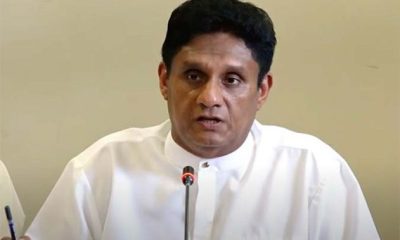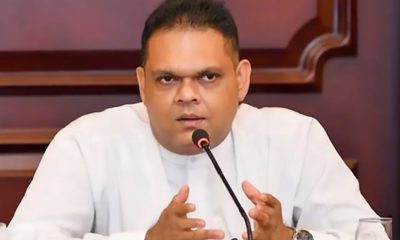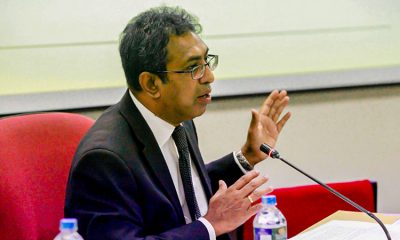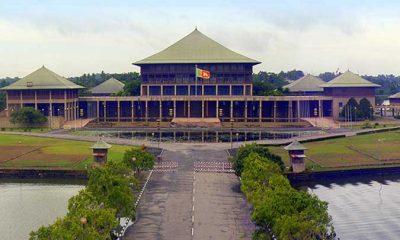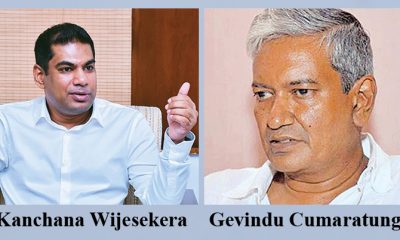Midweek Review
Post-Aragalaya Indo-Lanka relations and fake Immunoglobulin affair
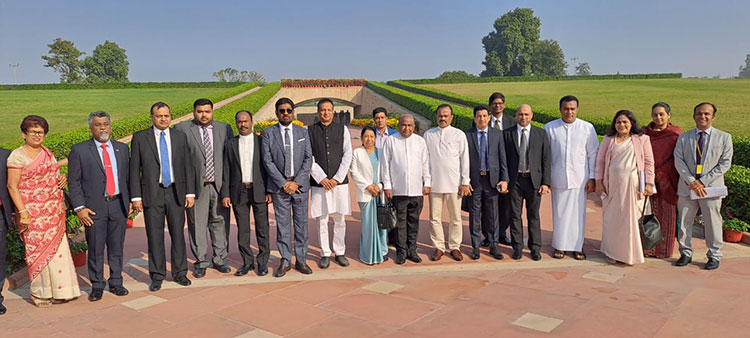
By Shamindra Ferdinando
Amidst deepening political turmoil over the suspension of nearly 150 Opposition members, following an unprecedented Parliament security breach in India, on December 13, a group of Sri Lankan parliamentarians, led by Speaker Mahinda Yapa Abeywardena, MP, visited the scene of chaos.
A total of 146 MPs in the Lok Sabha (Lower House) and the Rajya Sabha (Upper House) have been suspended for the rest of the winter session. Of them, 100 represented the Lok Sabha.
The Sri Lankan delegation was the first parliamentary group, from any country, to visit the new India Parliament, opened under controversial circumstances on May 28, 2023. The Opposition boycotted the inauguration, alleging that the BJP leader and Indian Premier Narendra Modi violated the constitution by opening the new triangular-shaped building, built at an estimated cost of $120m. The Opposition insisted that it should have been opened by the President.
The 22nd anniversary of the attack on the Indian Parliament fell on December 13, 2023. Gunmen attacked the building on Dec 13, 2001. They killed more than a dozen persons. India blamed Pakistan-linked terror groups for that attack, plunging relations between the two neighbours further, while also pushing the two nuclear-armed rivals to the brink of war.
Speaker Abeywadena’s delegation arrived in New Delhi on December 16 as the ruling BJP and the Opposition battled over the Parliament security breach. The first visiting foreign delegation, included Environment Minister Keheliya Rambukwella (SLPP), now under a cloud over the procurement of fake Immunoglobulin vials, as well as other medicines, during the continuing economic-political-social crisis here. The former UNPer has been accused of taking cover behind a life-saving Indian credit line, at the time he served as the Health Minister, even though the massive amounts involved in the scam, in fact had, been settled immediately in cash. In addition to the Speaker and Minister Rambukwella, there had been nine MPs and a few other officials, including the Secretary General of Parliament Kushani Rohanadeera.
The Criminal Investigation Department (CID) arrested Janaka Sri Chandragupta, who had served as the Health Secretary, as well as the head of the procurement committee at the time the Health Ministry allegedly perpetrated the massive frauds, as was unraveled during the probe, as the Sri Lankan delegation was visiting the Indian Parliament on Dec 18.
The revelation that the proprietor of Isolez Biotech Pharma AG, Sugath Janaka Fernando alias Aruna Deepthi, who had been remanded for supplying fake medicine in connivance with those tasked with procurement process falsely claimed that they were obtained from a Gujarat based company, made matters worse.
Collaboration in pharmaceuticals
The Indian High Commission in Colombo, the Foreign Ministry here, as well as Sri Lanka Parliament, dealt with the visit (Oct, 16-20) in separate media releases. Reference was made in the Sri Lankan Foreign Ministry statement to enhance collaboration in trade, investment, tourism, pharmaceuticals, education, defence and cooperation in the international fora.
Reference to collaboration in pharmaceuticals seemed ridiculous against the backdrop of the shocking exposure of the procurement of fake Immunoglobulin, a life-saving drug. Former State Health Minister Prof. Channa Jayasumana told the writer that the country’s once proud health service had suffered irreversible damage and deteriorated to such an extent there seemed to be no hope.
The Sri Lankan delegation called on Indian Vice President Jagdeep Dhankar on December 18. They were received by the Speaker of Lok Sabha Om Birla also on the same day. In addition, the Indian Speaker hosted a banquet lunch in honour of the visiting Sri Lankan delegation.
The delegation separately met the External Affairs Minister (EAM) Dr. S. Jaishankar. The visiting Parliamentarians from Sri Lanka witnessed the proceedings in both Houses of the Indian Parliament and also engaged in productive discussions with several MPs, cutting across party lines, during the visit, according to the Indian HC statement.
Soon after the delegation’s return from New Delhi, Minister Rambukwella called a media briefing at the Information Department where he declared he was not involved in the corruption case. The Minister explained his version of the procurement process and how he intervened to stop payments for fake products when the matter was brought to his notice.
But what he failed to say was that payments for the particular fraudulently obtained tenders had already been made by his Ministry in a rather haste manner in cash on the instructions of Chandragupta, even though they all claimed the drugs were procured on the credit line.
Sri Lanka Parliament couldn’t absolve itself of the responsibility for the continuing crisis in the health sector, particularly against the backdrop of a three-day debate on health sector corruption in early Sept this year, failed to produce the desired result. The ruling SLPP comfortably defeated an Opposition moved no-faith motion against then Health Minister Rambukwella on Sept. 08 in Parliament. The SJB-led effort failed to muster the required support. However, the SJB bid was definitely destined to fail. Altogether 113 MPs voted against, 74 voted for and the rest were absent. Obviously, those who had manipulated the entire process went ahead with the ‘project’ in the wake of the SLPP’s victory in Parliament.
Deputy Solicitor General (DSG) Lakmini Girihagama appearing with Senior State Counsel Heshani Wijesinghe making submissions on the progress of the CID investigations has told the Maligakanda Magistrate Court that prior to the Cabinet decision, taken in October 2022, tenders had been called in September 2022 and the 1st suspect Aruna Deepthi selected as the successful tenderer for human Immunoglobulin and Rituximab.
The DSG said according to the Ministry Chief Accountant Savidra Cooray the 1st suspect’s company Isolez Biotech Pharma had requested for payments for Rituximab supplied and the Secretary Health Chandragupta had approved the payment of Rs 107,799,481/= in three payments to the 1st suspect, directing it to be paid on a priority basis.
When the writer raised the issue with Minister Rambukwella, the bespectacled MP declined to comment on payments authorized by Chandragupta. The lawmaker claimed that he got to know about the matter through the media reportage of the DSG’s representations before the Maligakanda Magistrate.
The bottom line is that the Health Ministry made payments to a disgraced local company while deceiving the public by claiming the procurement had been made under the Indian credit line. The allocation for health sector procurement, according to Minister Rambukwella, has been USD 235 mn (USD 200 +USD 35) whereas the overall unprecedented assistance amounted to USD 4 billion extended in 2022. Whatever the criticism and concerns of India’s intentions and clandestine involvements here, if not for her prompt intervention, Sri Lanka could have gone up in flames under the then prevailing local circumstances. That is the unpalatable truth.
Against that background, perhaps India didn’t need to squander public funds on a visit by the Sri Lankan parliamentary delegation.
What Sri Lanka can gain from such a visit by a small group of its legislators is not clear though political parties here never declined opportunities for foreign jaunts on any flimsy excuse. During the Yahapalana administration (2015-2019) over 200 parliamentarians and parliamentary officials received the opportunity to visit China. China arranged group visits on a request made by the then Speaker Karu Jayasuriya, MP. As usual, political parties grabbed the opportunity without raising questions. The recently concluded visit to India, too, is no exception. That is the ugly truth.
Speaker mum on Wimal’s accusations
The big delegation was also the first since Foreign Ministry veteran Kshenuka Senewiratne recently succeeded Milinda Moragoda as Sri Lanka’s High Commissioner in New Delhi.
Post-Aragalaya Indo-Lanka relations cannot be discussed without taking into consideration high profile accusations that had been directed at India regarding her role in last year’s crisis. India never responded publicly to unsubstantiated accusations that the Modi government refused to evacuate the then President Gotabaya Rajapaksa and his wife, Ayoma, over his refusal to sack Premier Ranil Wickremesinghe to pave the way for Speaker Abeywardena to assume duties as the caretaker President, as was the wish of Washington as well.
Sri Lanka Constitution doesn’t permit the Speaker to move up as long as the President, or the Premier, remained in office.
Speaker Abeywardena, too, never publicly contradicted National Freedom Front (NFF) leader Wimal Weerawansa’s narrative based on the often repeated assertion that the outgoing US Ambassador Julie Chung asked Speaker Abeywardena, on the night of July 09, 2022, to assume presidency. Lawmaker Weerawansa first made the unprecedented accusation on April 25, 2023 at the launch of 09: Sengawuna Kathawa (09: The Hidden Story) at Sri Lanka Foundation.
The former minister repeated the accusation in public on several occasions ever since, though the Speaker has chosen to remain eerily silent, though it being even a matter of global interest as the American Ambassador in Sri Lanka had allegedly attempted to stage a midnight behind the scene constitutional coup here.
Ambassador Chung immediately contradicted the allegation though Speaker Abeywardena never responded to her stock denial or the former JVPer’s public allegation, in or outside Parliament. However, Speaker Abeywardena is widely believed to have privately acknowledged the US Ambassador’s uncalled for and unscheduled visit to his official residence, hours after President Gotabaya Rajapaksa and his wife boarded an SLN warship formerly of the US Coast Guard at the Colombo Port. They were taken to Trincomalee. The rest is history.
Sri Lanka needs to conduct a comprehensive inquiry into President Gotabaya Rajapaksa’s ouster, obviously instigated by outside forces in a campaign that lasted just three and half months, following the massive eruption of staged violence at Pangiriwatte, Mirihana, on the night of March 31, 2022, outside the President’s private residence.
While appreciating prompt life-saving assistance provided by India and ongoing efforts to foster closer relations at all levels, including between the two parliaments, Sri Lanka should do whatever necessary to ascertain the truth. The people have a right to know. Remember the adage those who fail to learn from history are condemned to repeat it!
In spite of NFF leader Weerawansa’s damning accusations in respect of India’s alleged role in the US-led project to change the government here, undemocratically, his colleague Mohammed Muzammil (NPP National List) was ironically a member of Speaker Abeywardena’s delegation. The other members were Deputy Speaker Ajith Rajapaksa, Deputy Chairman of Committees Angajan Ramanathan (SLFP), Keheliya Rambukwella (SLPP), Niroshan Perera (SJB), Varuna Liyanage (SJB), Weerasumana Weerasinghe (CP), M. Udayakumar (SJB), M. Rameshwaran (SLPP) and Jagath Samarawickrema (SLPP). Interestingly, MP Weerawansa, criticized US and Indian interventions during a speech he delivered in London on Dec 17, while his longtime parliamentary colleague was on a tour of India, courtesy the Indian External Affairs Ministry.
Speaker Abeywardena’s delegation didn’t include at least one member of the Tamil National Alliance (TNA), represented in the current Parliament by 10 MPs, nor the smaller Tamil parties. Perhaps, India conducts a separate dialogue with them for obvious reasons.
Sri Lanka needs to examine the whole gamut of issues, taking into consideration widening US-India relations in response to perceived Chinese threat. Unfortunately, Sri Lanka seems to be incapable of addressing the issues at hand. The failure on the part of the Wickremesinghe-Rajapaksa government to inquire into external funding of President Gotabaya Rajapaksa’s ouster is a case in point.
Ranil Wickremesinghe, who had been elected in July 2022, by Parliament, to complete the remainder of Gotabaya Rajapaksa’s five-year term, never ordered an inquiry though he acknowledged the conspiracy meant to oust him as the Premier thereby depriving him of the presidency.
The bone of contention is whether interested parties perpetrated the economic collapse to pave the way for the change of government and IMF intervention, thereby tying Sri Lanka to overall US and US-India strategies.
July 2022 bid to storm Parliament
Indian Parliament took stringent action against Opposition MPs for a security breach in Parliament, though they weren’t involved in the ‘raid’ at all. The BJP-led government found fault with the Opposition for relentless attacks over the ‘raid,’ particularly claims that the security breach was meant to highlight growing unemployment due to Premier Modi’s policies. Of course, no one can find fault with the Indian Opposition for seeking advantage at the expense of the BJP seeking a third consecutive term at the parliamentary polls scheduled for next year.
It would be pertinent to discuss the threat to the Sri Lanka Parliament last year. The violent protest campaign that had killed eight persons, including a ruling party MP, and destroyed several dozens of valuable properties belonging to those elected on the SLPP ticket in May 2022, in the aftermath of utterly stupid attacks on Galle Face protesters that was used as the continuing raison d’être by foreign sponsored rioters, for even an abortive bid to seize the Parliament.
Had they succeeded in taking over the Parliament in the immediate aftermath of setting fire to the then Premier Ranil Wickremesinghe’s Kollupitiya residence and forcing him to resign, the situation today could have been far worse. Had that succeeded, we wonder what the rest of the plot would have been? Would we be ruled now by cardboard comrades, remotely controlled from Washington and New Delhi? But, as Weerawansa also claimed, plan ‘A’ went awry due to Speaker Abeywardena’s refusal to join the US-led plot, thereby paving the way for the implementation of plan ‘B’ under President Wickremesinghe’s leadership.
Let me reproduce three media statements issued by the Indian HC in Colombo to help the reader recollect the protest campaign that was brought to an end by UNP leader Wickremesinghe within 24 hours after he was elected the President by Parliament. Wickremesinghe achieved that by chasing those who occupied the Presidential Secretariat and other government properties as he declared he wouldn’t succumb to those who sought to remove him from politics.
On April 02, 2022, just 48 hours after the staged explosion of public anger outside the President’s private residence at Pangiriwatte, Mirihana, the IHC stated: “High Commission strongly denies blatantly false and completely baseless reports in a section of media that India is dispatching its soldiers to Sri Lanka. The High Commission also condemns such irresponsible reporting and expects the concerned to desist from spreading rumours.
On May 07, 2022, two days before goons ,unleashed from Temple Trees, attacked Galle Face protesters, possibly in an utter act of desperation over the failure of law enforcers to clamp down on so-called “peaceful” protesters, who had by then even commandeered the President’s office, IHC issued the following statement: “We have seen reports that a water cannon vehicle was imported by the Government of Sri Lanka, under a credit line extended by Government of India. These reports are factually incorrect.
No water cannon vehicles have been supplied by India under any of the credit lines extended by India to Sri Lanka. Credit line of USD 1 billion to Sri Lanka is intended to help the people of Sri Lanka with availability of food, medicines and other essential items required by the people of Sri Lanka in the current situation. Such incorrect reports don’t make any constructive contribution to the cooperation and efforts undertaken to address the ongoing challenges faced by the people of Sri Lanka.
On May 11, 2022, in the wake of destruction of lawmakers’ houses and killing of an MP, IHC stressed: “The High Commission would like to categorically deny speculative reports in sections of media and social media about India sending her troops to Sri Lanka. These reports and such views are also not in keeping with the position of the Government of India. The Spokesperson of the Ministry of External Affairs of India clearly stated yesterday that India is fully supportive of Sri Lanka’s democracy, stability and economic recovery.
Two months later, India denied the evacuation of President Gotabaya Rajapaksa and his wife. The IHC categorically denied what it called ‘baseless and speculative media reports’ that India facilitated the recent reported travel” of Rajapaksa and his brother, former Finance Minister Basil Rajapaksa, out of Sri Lanka.
“It is reiterated that India will continue to support the people of Sri Lanka as they seek to realise their aspirations for prosperity and progress through democratic means and values, established democratic institutions and constitutional framework.”
Midweek Review
AKD’s Jaffna visit sparks controversy
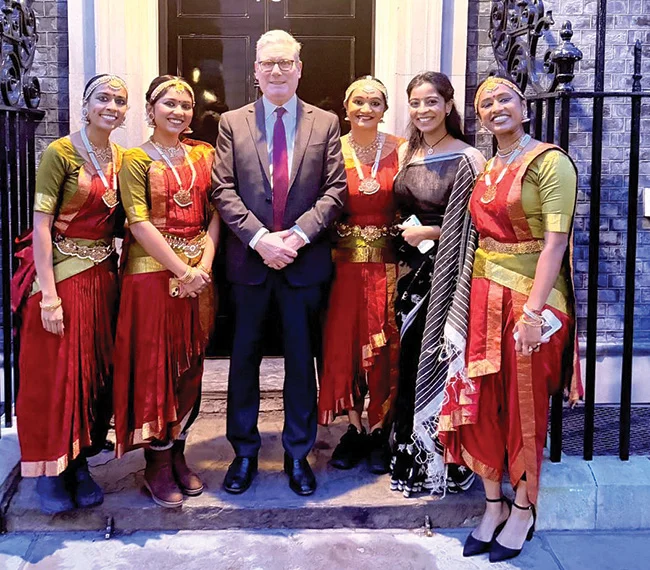
President Anura Kumara Dissanayake’s (AKD) recent visit to Jaffna received significant social media attention due to posting of a less than a minute-long video of him going for a walk there.
An unarmed soldier was captured walking beside AKD who is also the Commander-in-Chief of the armed forces in addition to being the Defence Minister. A soldier carrying an assault rifle was seen walking behind AKD. There was another soldier in a pair of shorts walking just behind the President. AKD’s Personal Security Officer (PSO) was not on that video. By January 26th morning that video received 378 K ‘hits’ and 9.8 K reactions.
AKD was in a pair of shorts and running shoes. There hadn’t been a previous occasion in which AKD was captured in a pair of shorts during his time as a lawmaker or the President. AKD was there on a two-day visit that coincided with Thai Pongal.
AKD’s latest visit to Jaffna for Thai Pongal caused a huge controversy when he declared that those who visited Buddhist shrines there influenced and encouraged hate. “Coming to Jaffna to observe sil on a Poya Day, while passing the Sri Maha Bodhi, is not virtue, but hatred,” AKD declared. The utterly uncalled for declaration received the wrath of the Buddhists. What made AKD, the leader of the JVP, a generally avowed agnostics, as well as NPP, to make such an unsubstantiated statement?
Opposition political parties did not waste much time to exploit AKD’s Jaffna visit to their advantage. They accused AKD of betraying the majority Buddhists in the country. Those who peruse social media know how much AKD’s Jaffna talk angered the vast majority of people aware of the sacrifices made by the armed forces and police to eradicate terrorism.
If not for the armed forces triumph over the LTTE in May 2009, AKD would never have ended up in the Office of the President. That is the undeniable truth. Whatever, various interested parties say, the vast majority of people remember the huge battlefield sacrifices made by the country’s armed forces that made the destruction of the LTTE’s conventional military power possible. Although some speculated that the LTTE may retain the capability to conduct hit and run attacks, years after the loss of its conventional capacity, the group couldn’t stage a comeback, thanks to eternal vigilance and the severity of its defeat.
AKD’s attention-grabbing Jaffna walk is nothing but a timely reminder that separatist Tamil terrorism had been defeated, conclusively. Of course, various interested parties may still propagate separatist views and propaganda but Eelam wouldn’t be a reality unless the government – whichever political party is in power – created an environment conducive for such an eventuality.
The JVP/NPP handsomely won both the presidential and parliamentary polls in Sept. and Nov. 2024, respectively. Their unprecedented triumph in the Northern and Eastern provinces emboldened their top leadership to further consolidate their position therein at any cost. However, an unexpected and strong comeback made by one-time LTTE ally, the TNA, appeared to have unnerved the ruling party. On the other hand, the TNA, too, seems to be alarmed over AKD’s political strategy meant to consolidate and enhance his political power in the North.
Perhaps, against the backdrop of AKD’s Jaffna walk, we should recollect the capture of Jaffna, the heart of the separatist campaign during President Chandrika Bandaranaike Kumaratunga’s time. Jaffna town was regained in the first week of December, 1995, 11 years before the outbreak of Eelam War IV (August 2006 to May 2009).
Operation Riviresa
In the run-up to the January 2015 presidential election, Kumaratunga, who served two terms as President (1994 to 1999 and 2001 to 2005), declared that her administration liberated 75% of the territory held by the LTTE. That claim was made in support of Maithripala Sirisena’s candidature at the then presidential election. Kumaratunga joined hands with the UNP’s Ranil Wickremesinghe, the JVP (NPP was formed in 2019), the SLMC and the TNA to ensure Sirisena’s victory.
Liberating 75% of territory held by the LTTE was nothing but a blatant lie. That claim was meant to dispute war-winning President Mahinda Rajapaksa’s bid for a third term. Ahead of the 2005 presidential election, Kumaratunga’s administration lost the capacity to conduct large-scale ground offensives in the Northern theatre of operations. In fact, the last major offensive, codenamed Agni Kheelsa in April 2001, had been undertaken in the Jaffna peninsula where the Army suffered debilitating losses, both in men and material. That was President Kumaratunga’s last attempt to flex military muscle. But, she should be credited for whole-heartedly supporting Operation Riviresa (Aug. to Dec. 1995) that brought back Jaffna under government control.
In spite of several major attempts by the LTTE to drive the Army out of Jaffna, the military held on. The largest ever combined security forces offensive, under President Mahinda Rajapaksa, with the Navy and Air Force initiating strategic action against the LTTE and the triumph over separatist terrorism in two months short of three years, should be examined taking into consideration the liberation of the Jaffna peninsula and the islands.
If President Kumaratunga failed to bring Jaffna under government control in 1995 and sustain the military presence there, regardless of enormous challenges, the war wouldn’t have lasted till 2006 and the outcome of the war could have gone the other way much earlier. Whatever the criticism of Kumaratunga’s rule, liberating the Jaffna peninsula is her greatest achievement. Regardless of financial constraints, Kumaratunga and her clever and intrepid Treasury Secretary, the late A.S. Jayawardena, provided the wherewithal for the armed forces to go on the offensive. After the successful capture of Jaffna, by the end of 1995, Kumaratunga ordered Kfirs and MiG 27s, and a range of other weapons, including Multi Barrel Rocket Launchers (MBRLs), to enhance the fire power, but the military couldn’t achieve the desired results. While she provided any amount of jaw, jaw, it was Amarananda Somasiri Jayawardena who ensured that the armed forces were provided with the necessary wherewithal, under difficult circumstances, especially in the aftermath of the later humiliating Wanni debacle, when he was the Central Bank Governor.
AKD is certainly privileged to engage in morning exercises in a terrain where some of the fiercest battles of the Eelam conflict were fought, involving the Indian Army, as well as other Tamil groups, sponsored by New Delhi, in the ’80s.
When the Army secured Jaffna, in 1995, and lost Elephant Pass in 2000, the forward defence lines had to be re-established and defended at great cost to both men and material. By then, the Vanni had become the LTTE stronghold and successful ground offensive seemed impossible but under President Mahinda Rajapaksa’s political leadership the combined armed forces achieved the unthinkable – the annihilation of the LTTE in a way it couldn’t make a comeback at any level. AKD’s post that went viral recently is evidence that peace has been restored and maintained for the Commander-in-Chief to take a walk on a Jaffna street.
Social media comments on AKD’s Jaffna walk reflected public thinking, especially against the backdrop of that unwarranted claim regarding Buddhists influencing hatred by visiting Jaffna on a Poya Day to observe sil, having passed the Sri Maha Bodhi.
UK anti-SL campaign
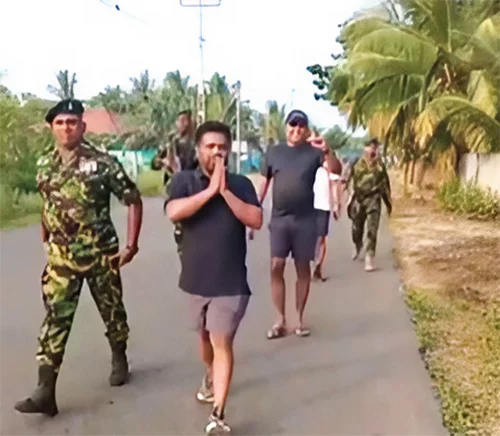
President Dissanayake taking a walk
It would be pertinent to ask the Sri Lanka High Commission in the UK regarding action taken to counter the continuing propaganda campaign against the country. Sri Lankan HC in the UK Nimal Senadheera owed an explanation as UK politicians seemed to be engaged in a stepped-up Sri Lanka bashing with the NPP government not making any effort to counter such propaganda against our country.
Interestingly, the UK government is on a collision course with no less a person than President Donald Trump over his recent humiliating comments on NATO troops who fought alongside the Americans in Afghanistan.
British Prime Minister Keir Starmer is on record as having said that President Trump’s comments were “insulting and frankly appalling.” Starmer suggested the US President apologise for his remarks. Amidst strong protests by humiliated NATO countries, President Trump retracted his derogatory comments.
But the UK’s position with regard to Tamil terrorism that also claimed the lives of nearly 1,500 Indian officers and men seemed different. The UK continues to ignore crimes perpetrated by the LTTE, including rival Tamil groups, political parties and Tamil civilians.
The Labour Party that promoted and encouraged terrorism throughout the war here raised the post-war Sri Lanka situation again.
The Labour Party questioned the British government in the House of Commons recently on what action it was taking to support Tamils seeking justice for past and ongoing abuses in Sri Lanka.
Raising the issue on 20 January 2026, Peter Lamb, the Labour MP for Crawley, asked: “What action is the UK Government taking to support Tamils in seeking justice for past and current injustices?”
Responding on behalf of the government, Hamish Falconer, Parliamentary Under-Secretary of State at the Foreign, Commonwealth and Development Office, said the UK remained actively engaged in accountability for crimes committed against the Tamil people.
“The UK is active in seeking justice and accountability for Sri Lanka’s Tamil community,” Falconer told the House. He said Britain continues to play a leading role at the United Nations Human Rights Council on resolutions addressing Sri Lanka’s human rights record.
Falconer added that the UK had taken concrete steps in recent years, including imposing sanctions. “Last year, we sanctioned Sri Lankans for human rights violations in the civil war,” he said, referring to measures targeting individuals implicated in serious abuses.
He also stated that the UK had communicated its expectations directly to Colombo. “We have made clear to the Sri Lankan Government the importance of improved human rights for all in Sri Lanka, as well as reconciliation,” Falconer said.
Concluding his response, Falconer marked the Tamil harvest festival, adding, “Let me take the opportunity to wish the Tamil community a happy Thai Pongal.”
The UK cannot be unaware that quite a number of ex-terrorists today carry British passports.
David Lammy’s promise
Our High Commissioner in London Nimal Senadheera, in consultation with the Foreign Ministry in Colombo, should take up the Parliamentary Under-Secretary of State at the Foreign, Commonwealth and Development Office Hamish Falconer’s comment on sanctions imposed on Sri Lankans in March 2025. Falconer was referring to General (retd.) Shavendra Silva, Admiral of the Fleet Wasantha Karannagoda, General (retd), Jagath Jayasuriya and one-time LTTE commander Vinayagamoorthy Muralitharan, aka Karuna Amman.
The then Secretary of State for Foreign, Commonwealth and Development Affairs, David Lammy, declared in March 2025 that the above-mentioned Sri Lankans were sanctioned in line with election promises. A UK government statement quoted Lammy as having said: “I made a commitment during the election campaign to ensure those responsible are not allowed impunity. This decision ensures that those responsible for past human rights violations and abuses are held accountable.”
Since then David Lammy has received the appointment as Lord Chancellor, Secretary of State for Justice and Deputy Prime Minister.
Recent Thai Pongal celebrations held at 10 Downing Street for the second consecutive year, too, was used to disparage Sri Lanka with reference to genocide and Tamils fleeing the country. They have conveniently forgotten the origins of terrorism in Sri Lanka and how the UK, throughout the murderous campaign, backed terrorism by giving refuge to terrorists.
The British had no qualms in granting citizenship to Anton Balasingham, one-time translator at the British HC in Colombo and one of those who had direct access to LTTE leader Velupillai Prabhakaran. Balasingham’s second wife, Australian-born Adele, too, promoted terrorism and, after her husband’s demise in Dec 2006, she lives comfortably in the UK.
Adele had been captured in LTTE fatigues with LTTE women cadres. The possibility of her knowing the LTTE suicide attack on former Indian Prime Minister Rajiv Gandhi in May 1991 can never be ruled out.
With the British PM accommodating those campaigning against Sri Lanka at 10 Downing Street and the Deputy PM openly playing politics with the issues at hand, Sri Lanka is definitely on a difficult wicket.
Sri Lanka has chosen to appease all at the expense of the war-winning military. The NPP government never made a genuine effort to convince Britain to rescind sanctions imposed on three senior ex-military officers and Karuna. The British found fault with Karuna because he switched allegiance to the Sri Lankan military in 2004. The former eastern commander’s unexpected move weakened the LTTE, not only in the eastern theatre of operations but in Vanni as well. Therefore, the British in a bid to placate voters of Sri Lankan origin, sanctioned Karuna while accommodating Adele whose murderous relationship with the LTTE is known both in and outside the UK Parliament.
Some British lawmakers, in a shameless and disgraceful manner, propagated lies in the UK Parliament for obvious reasons. Successive governments failed to counter British propaganda over the years but such despicable efforts, on behalf of the LTTE, largely went unanswered. Our governments lacked the political will to defend the war-winning armed forces. Instead, the treacherous UNP and the SLFP got together, in 2015, to back a US-led accountability resolution that sought to haul Sri Lanka up before the Geneva-based United Nations Human Rights Council (UNHRC).
The possibility of those who propagated lies receiving monetary benefits from interested parties cannot be ruled out. Sri Lanka never bothered to counter unsubstantiated allegations. Sri Lanka actually facilitated such contemptible projects by turning a blind eye to what was going on.
The Canadian Parliament declaration that Sri Lanka perpetrated genocide during the conflict didn’t surprise anyone. The 2022 May announcement underscored Sri Lanka’s pathetic failure on the ‘human rights’ front. The Gotabaya Rajapaksa government struggling to cope with the massive protest campaign (Aragalaya) never really addressed that issue. Ranil Wickremesinghe, who succeeded Gotabaya Rajapaksa in July 2022, too, failed to take it up with Canada. The NPP obviously has no interest in fighting back western lies.
The Canada Parliament is the first national body to condemn Sri Lanka over genocide. It wouldn’t be the only parliament to take such a drastic step unless Sri Lanka, at least now, makes a genuine effort to set the record straight. Political parties, representing our Parliament, never reached a consensus regarding the need to defeat terrorism in the North or in the South. Of those elected representatives backed terrorism in the North as well as terroirism in the South. Perhaps, they have collectively forgotten the JVP terrorism that targeted President JRJ and the entire UNP Parliamentary group. The JVP attack on the UNP, in parliament, in August 1987, is a reminder of a period of terror that may not have materialised if not for the Indian intervention.
By Shamindra Ferdinando
Midweek Review
Some heretical thoughts on educational reforms

The term education originates from the Latin words ‘educare’, meaning ‘to bring up’, and educere, meaning ‘to bring forth’. The precise definition of education is disputed. But if it is linked with the obvious expected outcome of it – learning, then the definition of education changes to a resultant outcome of ‘a change in behaviour’.
Let me say this at the outset. I am not going to get embroiled in the nitty-gritty pros and cons of the current controversies hogging the headlines today. Except to say this. As every discerning and informed person says, we need educational reforms. There is near unanimity on that. It is the process – a long, and even tedious process – that needs to be carried out that gives rise to disagreements and controversy. A public discussion, stakeholder viewpoints and expert opinion should be given due time and consideration.
Sex education – “the birds and bees” to start with – has to be gradually introduced into school curricular. When? is the critical question that needs specific answers. Do we need to go by Western standards and practices or by a deep understanding of our cultural milieu and civilisational norms? One thing is clear in my mind. Introduction of sex education into school curricular must not be used – or abused – to make it a ‘freeway’ for indiscriminate enforcement of the whole human sexual spectrum before the binary concepts of human sexuality has been clearly understood by children – especially during their pre-pubertal and immediate post-pubertal adolescent years. I have explicitly argued this issue extensively in an academic oration and in an article published in The Island, under the title, “The child is a person”.
Having said that, let me get on to some of my heretical thoughts.
Radical thinkers
Some radical thinkers are of the view that education, particularly collective education in a regulated and organised school system, is systematic streamlined indoctrination rather than fostering critical thinking. These disagreements impact how to identify, measure, and enhance various forms of education. Essentially, what they argue is that education channels children into pliant members of society by instilling existing or dominant socio-cultural values and norms and equipping them with the skills necessary to become ‘productive’ members of that given society. Productive, in the same sense of an efficient factory production line.
This concept was critiqued in detail by one of my favourite thinkers, Ivan Illych. Ivan Illich (1926 – 2002) was an Austrian philosopher known for his radical polemics arguing that the benefits of many modern technologies and social arrangements were illusory and that, still further, such developments undermined humans’ image of self-sufficiency, freedom, and dignity. Mass education and the modern medical establishment were two of his main targets, and he accused both of institutionalising and manipulating basic aspects of life.
One of his books that stormed into the bookshelves that retains particular relevance even today is the monumental heretical thought ‘Deschooling Society’ published in 1971 which became his best-known and most influential book. It was a polemic against what he called the “world-wide cargo cult” of government schooling. Illich articulated his highly radical ideas about schooling and education. Drawing on his historical and philosophical training as well as his years of experience as an educator, he presented schools as places where consumerism and obedience to authority were paramount. Illich had come to observe and experience state education during his time in Puerto Rico, as a form of “structured injustice.”
‘Meaningless credentials’
Ilych said that “genuine learning was replaced by a process of advancement through institutional hierarchies accompanied by the accumulation of largely meaningless credentials”. In place of compulsory mass schooling, Illich suggested, “it would be preferable to adopt a model of learning in which knowledge and skills were transmitted through networks of informal and voluntary relationships”. Talking of ‘meaningless credentials’ it has become the great cash-cow of the education industry the world over today – offering ‘honorary PhDs’ and ‘Dr’ titles almost over the counter. For a fee, of course. I wrote a facebook post titled “Its raining PhDs!”.
Mass education and the modern medical establishment were two of his main targets, and he accused both of institutionalising and manipulating basic aspects of life. I first got to ‘know’ of him through his more radical treatise “Medical Nemesis: The expropriation of Health”, that congealed many a thought that had traversed my mind chaotically without direction. He wrote that “The medical establishment has become a major threat to health. The disabling impact of professional control over medicine has reached the proportions of an iatrogenic epidemic”. But it was too radical a thought, far worse than ‘Deschooling Society’. The critics were many. But that is not our topic for the day.
The other more politically radical views on education comes from Paul Freire. Paul Freire (1921 – 1997) was a Brazilian educator and Marxist philosopher whose work revolutionised global thought on education. He is best known for his 1968 book “Pedagogy of the Oppressed” in which he reimagines teaching as a “collaborative act of liberation rather than transmission”. A founder of critical pedagogy, Freire’s influence spans literary movements, liberation theology, postcolonial education, Marxism, and contemporary theories of social justice and learning. He is widely regarded as one of the most important educational theorists of the twentieth century.
Neutral education process?
Richard Shaull, in his introduction to the 13th edition of ‘Pedagogy of the Oppressed’ wrote: “There is no such thing as a neutral education process. Education either functions as an instrument which is used to facilitate the integration of generations into the logic of the present system and bring about conformity to it, or it becomes the “practice of freedom”, the means by which men and women deal critically with reality and discover how to participate in the transformation of their world”.
Here are a few quotes from Paul Freire before I revert to the topic I began to write on: “Liberating education consists in acts of cognition, not transferals of information.”; he believed that “true liberation comes from the oppressed taking agency and actively participating in the transformation of society”; he viewed “education as a political act for liberation – as the practice of freedom for the oppressed.”; He said that “traditional education is inherently oppressive because it serves the interests of the elite. It helps in the maintenance of the status quo.”
Where does our own ‘educational reforms’ stand? Is it transference, transformative, liberating or an attempt at maintaining the status quo with the help of the ADB? The history of educational reforms in Sri Lanka has been long. A quick check on the internet elicited the following:
Colonial Era (Pre-1940s): Colebrooke-Cameron Commission (1830s): Promoted English and standardised curriculum, laying groundwork for modern systems.
Buddhist Revival: Efforts by Anagarika Dharmapala to establish schools with Buddhist principles and English education.
The Kannangara Reforms (1940s): 1943 – Minister C.W.W. Kannangara introduced free education for all funded by general taxes; 1947 – introduced it from kindergarten to university. Central Schools (Madhya Maha Vidyalayas) established high-quality secondary schools in rural areas to ensure equitable access. Medium of Instruction was mandated to be the national languages (Sinhala and Tamil) for primary education.
Nationalisation and Standardisation
Nationalisation and Standardisation (1960s-1970s): 1961 – Denominational schools were taken over by the government to create a national education system. 1972 – New attempts at reform introduced following the 1971 youth uprising, focusing on democratising education and practical skills through a common curriculum and a national policy, responding to socio-economic needs. Introduction of language-based standardisation that in all likelihood triggered the ‘separatist war’. 1978 – change from language-based standardisation to district-based standardisation on a quota system for university entrance that was first introduced with a promise for only ten years, but persists until today, for nearly 50 years. No government dares to touch it as it is politically explosive.
Focus on quality and access (1980s-1990s): White Paper on Education (1981) – aimed to modernise the system together with components of privatising higher education. It faced severe criticism and public protests for its clear neoliberal leanings. And it never got off the ground. The National Colleges of Education (1986) were established.
1987 – Devolution of education power to provincial councils. 1991 – Establishment of The National Education Commission created to formulate long-term national policies. 1997 – Comprehensive reforms through a Presidential Task Force to overhaul the general education system (Grades 1-13), including early childhood development and special and adult education.
21st Century Reforms (2000s-Present): Mid-1990s-early 2000s – focused on transforming education from rote learning to competency-based, problem-solving skills; emphasising ICT, English, equity, and aligning education with labour market needs; introducing school restructuring (junior/senior schools) and compulsory education for ages 5-14; and aiming for national development through development of human capital.
Modernising education
2019 educational reforms focused on modernising education by shifting towards a modular, credit-based system with career pathways, reducing exam burdens, integrating vocational skills, and making education more equitable, though implementation details and debates around cultural alignment continued. Key changes included introducing soft skills and vocational streams from Grade 9/10; streamlining subjects, and ensuring every child completes 13 years of education; and moving away from an excessive focus on elite schools and competitive examinations.
This government is currently implementing the 2019 reforms in the National Education Policy Framework (2023–2033), which marks a radical departure from traditional methods. Module-Based System and a shift from exam-centric education to a module-based assessment system starting in 2026.
Already we have seen multi-pronged criticisms of these reforms. These mainly hinge on the inclusion – accidentally or intentionally – of a website for adult male friend groups. The CID is investigating whether it was sabotage.
Restricting access to social media
When there is a global concern on the use of smartphones and internet by children, and where Australia has already implemented a new law in December 2025 banning under-16s from major social media platforms to protect children from cyberbullying, grooming, and addiction, requiring tech companies to use age verification.
The U.S. does not have a federal law banning smartphones for under-16s, but a major movement, fuelled by the US Surgeon-General warnings and research on youth mental health, is pushing for restrictions, leading many individual states (like California, Florida, Virginia) to enact laws or guidelines for school-day bans or limits for students, focusing on classroom distraction and social media risks, with some advocates pushing for no smartphones before high school or age 16.
The UK doesn’t currently have a legal ban on smartphones for under-16s, but there’s significant political and public pressure for restrictions, with debates focusing on social media access and potential school bans, with some politicians and experts advocating bans similar to Australia’s, while others push for stronger regulations under the existing Online Safety Act to protect children from addictive algorithms and harm.
Sweden is implementing a nationwide ban on mobile phones in schools for students aged 7 to 16, starting in autumn 2026, requiring devices to be handed in until the school day ends to improve focus, security, and academic performance, as part of a major education reform. This national law, not just a recommendation, aims to reduce distractions and promote traditional learning methods like books and physical activity, addressing concerns about excessive screen time affecting children’s health and development.
Norway doesn’t have a complete smartphone ban for under-16s but is moving to raise the minimum age for social media access to 15 and has implemented strong recommendations, including a ban on phones in schools to protect children from harmful content and digital overexposure, with studies showing positive impacts on focus and well-being. The government aims to shield kids from online harms like abuse and exploitation, working with the EU to develop age verification for platforms like TikTok and Instagram.
Finland implemented a law in August 2025 restricting smartphone use for students aged 7-16 during the school day, empowering teachers to ban devices in classrooms, meals, and breaks, except for educational or health reasons, to combat distractions, improve focus, and support student well-being and social skills. The move aims to create calmer learning environments, reduce cyberbullying, and encourage more in-person interaction, giving teachers control to confiscate disruptive phones, though digital tools remain part of education.
Trend in liberal west
When this is the trend in the ‘liberal West’ on the use of smartphones by children in schools, did not our educational reform initiators, experts and pundits in the NIE not been observing and following these worldwide trends? How could they recommend grade 6 children to go to (even a harmless legitimate) website? Have they been in hibernation when such ‘friend/chat room’ sites have been the haunt of predatory paedophile adults? Where have they been while all this has been developing for the past decade or more? Who suggested the idea of children being initiated into internet friends chat rooms through websites? I think this is not only an irresponsible act, but a criminal one.
Even if children are given guided, supervised access to the internet in a school environment, what about access to rural children? What about equity on this issue? Are nationwide institutional and structural facilities available in all secondary schools before children are initiated into using the internet and websites? What kind of supervision of such activities have been put in place at school (at least) to ensure that children are safe from the evils of chat rooms and becoming innocent victims of paedophiles?
We are told that the new modular systems to be initiated will shift assessments from an exam-centric model to a modular-based, continuous assessment system designed to prioritise skill development, reduce stress, and promote active learning. The new reforms, supposed to begin in 2026, will introduce smaller, self-contained learning modules (covering specific topics or themes) with integrated, ongoing assessments.
Modular assessment and favouritism
I will not go into these modular assessments in schools in any detail. Favouritism in schools is a well-known problem already. 30% of final assessments to be entrusted to the class teacher is a treacherous minefield tempting teachers into corrupt practices. The stories emanating from the best of schools are too many to retell. Having intimate knowledge of what happens to student assignment assessments in universities, what could happen in schools is, to me, unimaginable. Where do the NIE experts live? In Sri Lanka? Or are they living in ideal and isolated ivory towers? Our country is teeming with corruption at every level. Are teachers and principals immune from it? Recently, I saw a news item when a reputed alumnus of “the best school of all” wrote a letter to the President citing rampant financial corruption in the school.
This article is already too long. So, before I wind up, let me get on to a conspiracy theory. Why have the World Bank and the ADB been pumping millions of USD into ‘improving’ our education system?
World Bank
The World Bank is the largest source of external financing for education in developing countries, maintaining an active portfolio of approximately $26 billion in 94 countries reaching an estimated 425 million students— roughly one-third of all students in low- and middle-income countries.
The World Bank funds education globally through loans, grants, and technical assistance to improve access, quality, and equity, focusing on areas like teacher training, digital infrastructure, and learning outcomes, with significant recent investment in Fragile, Conflict, and Violence (FCV) settings and pandemic recovery efforts. Funding supports national education strategies, like modernising systems in Sri Lanka, and tackles specific challenges such as learning loss, with approaches including results-based financing and supporting resilient systems. Note this phrase – ” … with significant recent investment in Fragile, Conflict, and Violence (FCV) settings ….”. The funds are monumental for FCV Settings – $7 billion invested in Fragile, Conflict, and Violence settings, with plans for $1.2 billion more in 2024-25. Now with our Ditwah disaster, it is highly fertile ground for their FCV investments.
Read Naomi Kline’s epic “The Shock Doctrine: The rise of disaster capitalism”. It tells it all. It must be read and digested to understand the psychology of funding for FCV settings.
The 40.3 million USD World Bank’s IRQUE (Improving Relevance and Quality of Undergraduate Education) Project in Sri Lanka (circa 2003-2009) was a key initiative to modernize the country’s higher education by boosting quality, accountability, and relevance to the job market, introducing competitive funding (QEF), establishing Quality Assurance (QA) functions for the first time, and increasing market-oriented skills, significantly reducing graduate unemployment. I was intimately involved in that project as both Dean/Medicine and then VC of University of Ruhuna. Again, the keywords ‘relevance to the job market’ comes to mind.
The Asian Development Bank (ADB) is heavily funding education reform in Sri Lanka, notably with a significant $400 million loan (Secondary Education Sector Improvement Program – SESIP) to transform secondary education, aligning it with global knowledge economy demands, improving curriculum, teacher training, and infrastructure for quality access. ADB also provides ongoing support, emphasising teacher training, digital tech, and infrastructure, viewing Sri Lanka’s youth and education as crucial for development. The keywords are ‘aligning it with global knowledge economy demands’. As of 2019, ADB loans for education totalled approximately $1.1 billion, with cumulative funding for pre-primary, primary, and secondary education exceeding $7.4 billion since 1970 in the Asia-Pacific region.
Radical view of IMF and WB
A radical view of the Bretton Woods twins – the International Monetary Fund (IMF) and the World Bank – and the ADB characterises them not as neutral facilitators of global economic stability and egalitarian economic development in poor countries, but as tools of Western hegemony, neoliberal imposition, and institutionalized inequality. From this perspective, these institutions, created to manage the post-WWII economic order, have evolved into instruments that perpetuate the dominance of the Global North over the Global South.
The World Bank and the ADB (in our part of the world) have been investing heavily on education reform in poor countries in Asia and Africa. Why? Surely, they are not ‘charity organisations’? What returns are they expecting for their investments? Let me make a wild guess. The long-term objective of WB/ADB is to have ‘employable graduates in the global job market’. A pliant skilled workforce for exploitation of their labour. Not for “education as a political act for liberation” as Paul Freire put it.
I need to wind up my heretical thoughts on educational reform. For those of us who wish to believe that the WB and ADB is there to save us from illiteracy, poverty and oppression, I say, dream on.
“Don’t let schooling interfere with your education. Education consists mainly of what we have unlearned.” – Mark Twain
by Susirith Mendis
Susmend2610@gmail.com
Midweek Review
A View from the Top
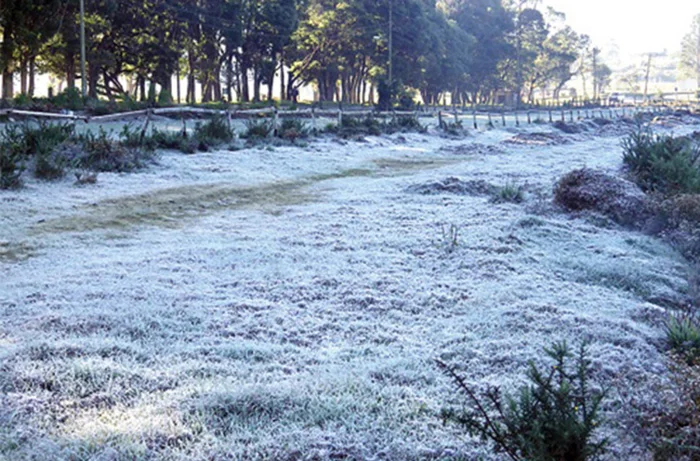
They are on a leisurely uphill crawl,
These shiny, cumbrous city cars,
Beholding in goggle-eyed wonder,
Snow gathering on mountain tops,
Imagining a once-in-a-lifetime photo-op,
But the battered land lying outside,
Gives the bigger picture for the noting eye,
Of wattle-and-daub hut denizens,
Keeping down slowly rising anger,
On being deprived the promised morsel.
By Lynn Ockersz
-

 Business7 days ago
Business7 days agoComBank, UnionPay launch SplendorPlus Card for travelers to China
-

 Business4 days ago
Business4 days agoClimate risks, poverty, and recovery financing in focus at CEPA policy panel
-

 Opinion3 days ago
Opinion3 days agoSri Lanka, the Stars,and statesmen
-

 Business2 days ago
Business2 days agoHayleys Mobility ushering in a new era of premium sustainable mobility
-

 Opinion7 days ago
Opinion7 days agoLuck knocks at your door every day
-

 Business2 days ago
Business2 days agoAdvice Lab unveils new 13,000+ sqft office, marking major expansion in financial services BPO to Australia
-

 Business2 days ago
Business2 days agoArpico NextGen Mattress gains recognition for innovation
-

 Editorial2 days ago
Editorial2 days agoGovt. provoking TUs


